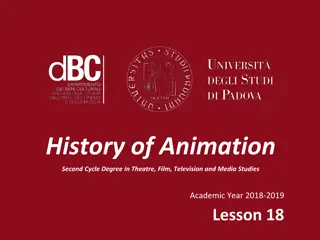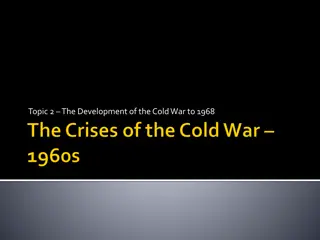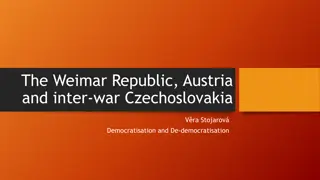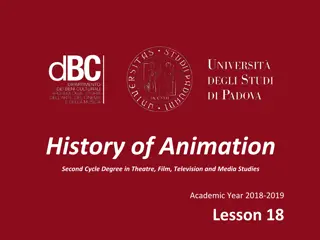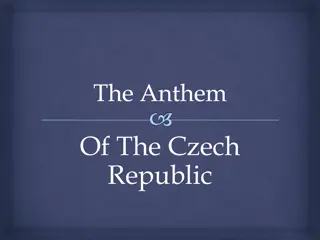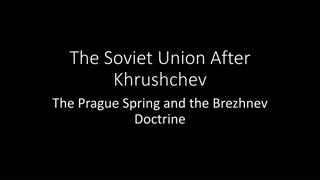Evolution of Animation in Eastern Europe: A Historical Overview
Before 1989, Eastern European animators faced challenges under Stalinism, leading to a focus on folk tales and legends. Czechoslovakia played a significant role with studios like AFIT and key figures like Karel Zeman and Jiří Trnka influencing the development of puppet animation and unique visual
0 views • 48 slides
The Cold War: Key Events up to 1968
West Berlin thrived while East Berlin suffered as the city became divided by a wall in 1961. The Vietnam War saw North and South Vietnam backed by different superpowers, leading to conflict until 1975. Cuba turned communist under Fidel Castro in 1959, prompting tensions with the US, notably during t
0 views • 9 slides
Democratisation and De-democratisation: The Weimar Republic, Austria, and Inter-war Czechoslovakia
The period between the World Wars saw the birth of new states like the Weimar Republic, Austria, and Czechoslovakia, each facing unique challenges. From the aftermath of WWI to the Treaty of Versailles and economic crises, these states navigated political extremism, hyperinflation, and territorial c
0 views • 35 slides
Animation in Europe Before and After 1989: A Look at Czechoslovakia's Pioneers
Czechoslovakian animation history reflects the impact of Stalinism, with a shift towards social and political themes post-1989. Key figures like Karel Zeman and Jiří Trnka played a significant role in shaping the country's animation landscape, blending puppet animation with live action in innovati
0 views • 48 slides
Anthem of the Czech Republic: History, Lyrics, and Significance
The anthem of the Czech Republic has a rich history dating back to the 19th century. Originally part of a play by Josef Kajetán Tyl, it quickly gained popularity and became a national song. The anthem's first verse, "Kde domov můj," was adopted as the national anthem upon the dissolution of Czecho
0 views • 7 slides
The Soviet Union Post-Khrushchev: Prague Spring & Brezhnev Doctrine
Explore the aftermath of Khrushchev's ouster, the impact on the Cold War, shifts in Soviet foreign policy due to Vietnam, the Prague Spring in Czechoslovakia, and the rise of the Brezhnev Doctrine, along with key points and leadership changes during this period.
0 views • 19 slides
